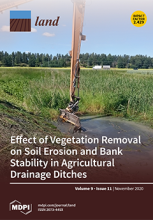/ library resources
Showing items 1 through 9 of 963.This special issue of Policy Matters focuses on the outreach and impact of Dr. Elinor Ostrom's groundbreaking research on common property (or commons) theory.
This paper estimates global logistic regression and logistic geographically weighted regression (GWR) models of urban growth in the adjacent border cities of Laredo, Texas in the United States and Nuevo Laredo, Tamaulipas in Mexico, for two time periods from 1985 to 2014.
This work proposes a methodology whereby the selection of hydrologic and land-use cover change (LUCC) models allows an assessment of the proportional variation in potential groundwater recharge (PGR) due to both land-use cover change (LUCC) and some climate change scenarios for 2050.
Urbanization of the countryside affects rural areas, especially in the immediate surroundings of large cities. Normally, this occurs as an unpromoted process, but in Chile, it is driven by the legal framework.
Soil quality indexes (SQIs) are very useful in assessing the status and edaphic health of soils.
Forests managed by Indigenous and other local communities generate important benefits for livelihood, and contribute to regional and global biodiversity and carbon sequestration goals. Yet, challenges to community forestry remain.
This paper offers an approach to Yucatecan social reality in terms of entrepreneurship and the process of creating companies dedicated to the production and/or commercialization of agroecological products, considering its contribution to sustainable rural development.
Rangeland management in former tropical rainforest areas may affect ecosystem services.
The ejido is an institution of communal land tenure and governance administered by the Mexican government.
Paginering
Land Library Search
Through our robust search engine, you can search for any item of the over 73,000 highly curated resources in the Land Library.
If you would like to find an overview of what is possible, feel free to peruse the Search Guide.




